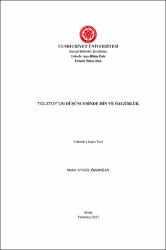| dc.contributor.advisor | Tüzer, Abdüllatif | |
| dc.contributor.author | Özdoğan, Melek Aygül | |
| dc.date.accessioned | 2020-10-15T07:23:39Z | |
| dc.date.available | 2020-10-15T07:23:39Z | |
| dc.date.issued | 2017 | tr |
| dc.date.submitted | 2017-06-30 | |
| dc.identifier.other | iii, 75 sayfa | |
| dc.identifier.uri | https://hdl.handle.net/20.500.12418/12402 | |
| dc.description.abstract | 19 yy. Rus Edebiyatının önde gelen isimlerinden olan ve daha çok da edebi yönüyle tanıdığımız Lev Tolstoy (1828-1910)’un düşüncelerinin felsefi yönü genellikle göz ardı edilmiştir. Onun anarşizm akımına olan etkisi, pozitivizm gibi bazı bilimsel kurumlara tepkisi, dönemin politik yaşamına başkaldırısı ya da dine ve özgürlüğe dair düşünceleri yeterince bilinmemektedir.
Tolstoy yaşamın, ölümün ve gerçeğin anlamını hayatı boyunca aramıştır ve tek bir gerçeğin var olduğuna dair inancını hiç kaybetmemiştir. Hayatın anlamını “sevgi” kavramında ve kurtuluşu da “kötülüğe karşı şiddet yoluyla direnmeme” ilkesinde bulmuştur. O, bütünün mutluluğunu amaç edinerek, bireylerin mutluluğuna engel olacak her türlü şeye karşı çıkmıştır, bu karşı çıkışlarından dolayı onun anarşist olduğu iddia edilmiştir.
Hayatın anlamını arayışı sırasında bilimlerden (soyut ve deneysel bilimler) ve felsefeden yararlanmıştır. Ancak ne bilimlerin ne de felsefenin insana âlemdeki yerini gösteremeyeceğine inancı kuvvetlidir. Çünkü bilim de felsefe de duygudan bağımsız olarak rasyonel olanı inceler. Oysa Tolstoy’a göre, insanın âlemle olan ilişkisi yalnızca akıl tarafından değil aynı zamanda duygular tarafından belirlenir. Tolstoy insanın âlemdeki yerini, insanın doğayla ilişkisini, yaşamın anlamını ve imkânını, “inanç”ta bulur. Ona göre inanç, insanı hayata bağlayan güçtür ve akıl sahibi her insan bir inanca sahiptir. Tolstoy da kendisinin Tanrı inancına sahip olduğunu ve buna inandığı sürece yaşadığını itiraf etmiştir. Yaşamak, Tanrıyı tanımak demektir; çünkü Tanrı onun için,yaşamdır.
Bu çalışmada; edebi yönünü iyi bildiğimiz Tolstoy’un aslında düşünsel yönünün de edebi yönü kadar önemli ve başarılı olduğunu göstermeyi ve felsefesini şekillendiren önemli kavramlardan “din ve özgürlük” konusundaki görüşlerini açıklamayı amaç edindim. | tr |
| dc.description.abstract | Lev Tolstoy (1828-1910), one of the prominent persons of 19th century’s Russian literature, is mostly known for his literal side and his philosophical and intellectual side is ignored. His effect on the anarchist movement, his reaction to some scientific theories such as positivism, rebellion in the political life his period or his thoughts of religion and freedom isn’t adequately known.
Tolstoy has investigated for the meaning of the life, death and truth during his life and he never lost his belief that there is only one truth. He found the meaning of life in the concepts of “love” and found the principle of “do not resist through violence against evil” in salvation. By taking his happiness as a goal, he objects all the things which obstacle the happiness of the humanity. Because of his objection there are some who claim that he is an anarchist.
During his investigation of the meaning of the life he benefits from science (abstract and experimental sciences) and also from philosophy. However, he has a strong belief that neither science nor philosophy can show that where the place of human in the universe is. Since both science and philosophy investigate the rationality independent of emotion. Whereas according to Tolstoy, the relation of human with universe is determined not only by intelligence but also by emotions. Tolstoy regards the place of human in the universe, the relation of human with universe, the meaning and the possibility of life in belief. Belief, according to him, is the power which connects human with life .Every person who has a ration believes. Tolstoy confesses that he lived as long as he has a belief in God. The meaning of life is to know God, because God is life to him.
In this study, I aimed to clarify that Tolstoy’s intellectual aspect, is as important and successful as the literary aspect and to explain his views on "religion and freedom" from the important concepts that shape his philosophy. | tr |
| dc.language.iso | tur | tr |
| dc.publisher | Sivas Cumhuriyet Üniversitesi-Sosyal Bilimler Enstitüsü | tr |
| dc.rights | info:eu-repo/semantics/openAccess | tr |
| dc.subject | Özgürlük | tr |
| dc.subject | Din | tr |
| dc.subject | Tolstoy | tr |
| dc.subject | Anarşizm | tr |
| dc.subject | Sevgi | tr |
| dc.title | Tolstoy'un Düşüncesinde Din ve Özgürlük | tr |
| dc.type | masterThesis | tr |
| dc.contributor.department | Sosyal Bilimler Enstitüsü | tr |
| dc.relation.publicationcategory | Tez | tr |















